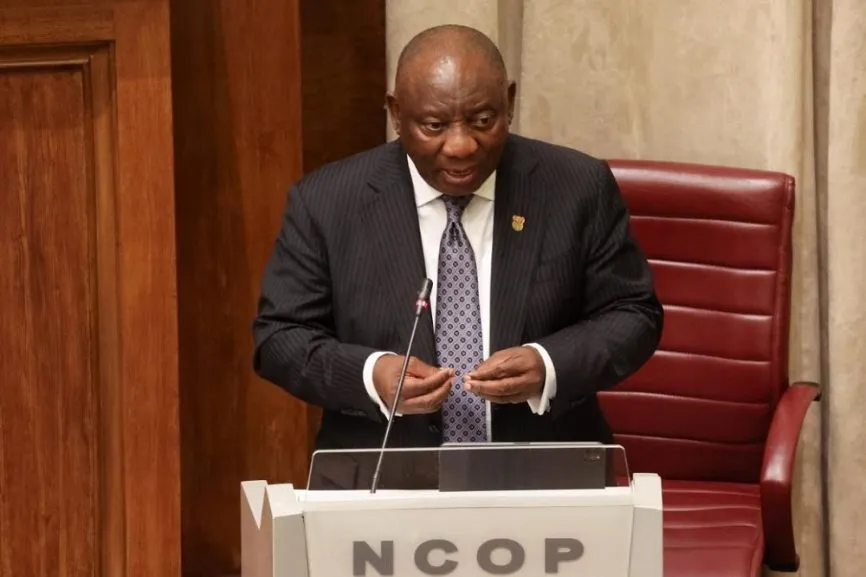Israel-Palestine peace deal won’t hamper ICJ case: Ramaphosa
Israel-Palestine peace deal won’t hamper ICJ case: Ramaphosa, said President Cyril Ramaphosa, emphasizing that South Africa’s case before the International Court of Justice (ICJ) will continue despite the recently signed peace agreement. The President reaffirmed the country’s stance on accountability and justice in the wake of the humanitarian crisis in Gaza.
Ramaphosa welcomes peace but insists on justice
President Cyril Ramaphosa expressed cautious optimism following the Israel-Palestine peace deal, brokered by the United States. The agreement includes a cessation of hostilities, the exchange of hostages, and the facilitation of humanitarian aid into Gaza — key steps toward restoring stability in the region.
However, Ramaphosa made it clear that while South Africa welcomes peace, it will not retract or pause its legal proceedings at the International Court of Justice (ICJ). “The peace deal that has been struck, which we welcome, will have no bearing on the case that is before the ICJ,” Ramaphosa said. “The case is proceeding, and Israel must respond to our pleadings by January next year.”
The South Africa genocide case at the ICJ
In December 2023, South Africa filed a historic genocide case against Israel at the International Court of Justice, accusing the Israeli government of committing acts that violate the 1948 Genocide Convention. The case centers on Israel’s military actions in Gaza, which Pretoria argues have caused severe civilian suffering and destruction.
The South Africa genocide case has drawn international attention, with many nations commending the country’s moral stance. The ICJ has since ordered provisional measures demanding Israel take steps to prevent genocide, protect civilians, and ensure humanitarian access — though full proceedings are still underway.
Ramaphosa reaffirmed South Africa’s position, stating that “the healing process in Palestine will not be complete without justice. True peace requires accountability, and the ICJ process will help establish that truth.”
Peace deal details: Ceasefire and humanitarian relief
The Israel-Palestine peace deal represents the first significant step toward ending months of conflict. The agreement, facilitated by Washington, includes:
-
A comprehensive ceasefire to halt military operations.
-
The exchange of hostages and detainees between both sides.
-
The unhindered flow of humanitarian aid into Gaza and the West Bank.
International leaders have praised the deal as a diplomatic breakthrough, though skepticism remains over its long-term sustainability. For South Africa, however, the focus remains on ensuring that the International Court of Justice fulfills its mandate to deliver justice for victims of war crimes and human rights abuses.
Ramaphosa: Peace does not erase accountability
Addressing reporters, President Cyril Ramaphosa emphasized that peace agreements and legal processes serve different purposes. “The peace deal is a political resolution; the ICJ case is a matter of justice and accountability,” he said.
He added that South Africa’s ICJ case is not aimed at derailing peace efforts but rather complementing them by addressing the root causes of violence — including impunity and systemic oppression. “Lasting peace can only emerge when justice has been done,” Ramaphosa reiterated.
South Africa’s role in global justice advocacy
South Africa has long positioned itself as a defender of human rights and international law. Since the end of apartheid, the nation has leveraged its moral authority to advocate for oppressed peoples globally.
By bringing the genocide case against Israel, South Africa reinforces its belief that international institutions must act when human rights are violated. Pretoria’s stance mirrors its historical struggle for justice and equality, aligning with the principles of the African Union and the United Nations Charter.
Ramaphosa has consistently called for nations to uphold the authority of the International Court of Justice, warning against selective justice. “We cannot pick and choose when international law applies,” he said during an address at the African Union Summit earlier this year.
Reactions from the international community
The announcement that the Israel-Palestine peace deal won’t hamper ICJ case: Ramaphosa drew mixed responses.
-
Human rights organizations, including Amnesty International and Human Rights Watch, welcomed South Africa’s firm position, noting that justice and peace must progress together.
-
Some Western diplomats expressed concern that continued ICJ proceedings could strain peace efforts, though most acknowledged South Africa’s right to pursue the case.
-
The Palestinian Authority expressed gratitude to Pretoria for its “steadfast support” and commitment to holding Israel accountable for alleged war crimes.
What’s next for the ICJ proceedings
According to President Cyril Ramaphosa, the International Court of Justice has requested Israel to file its formal response by January next year. Following this, the court will schedule hearings where both sides can present evidence.
Legal experts anticipate a lengthy process, as genocide cases typically involve extensive documentation and witness testimonies. Regardless of the timeline, South Africa remains committed to seeing the case through.
Ramaphosa stated: “Our duty is to stand on the side of justice, regardless of political convenience. The ICJ must be allowed to do its work independently and fairly.”
The significance of South Africa’s stand
The decision to continue with the South Africa genocide case despite the peace deal underscores Pretoria’s commitment to the rule of law. It also highlights the evolving role of African nations in shaping global justice narratives.
Analysts argue that South Africa’s stance could set a precedent, encouraging other countries to utilize international legal frameworks rather than resort to violence or political compromise.
Conclusion: Peace and justice must coexist
Israel-Palestine peace deal won’t hamper ICJ case: Ramaphosa — a statement that captures South Africa’s unwavering belief that peace without justice is incomplete. While the world celebrates the progress toward ending hostilities, Pretoria insists that accountability remains essential for true reconciliation.
As the International Court of Justice prepares to hear the case, President Cyril Ramaphosa continues to call for global solidarity in upholding international law. For South Africa, this is not just a legal matter but a moral one — a continuation of its legacy in the global fight for human rights and equality.
🌟 Thanks for reading! 🌟
We truly appreciate you taking the time to stay informed with eKayNews.co.za — your trusted source for the latest breaking news, politics, lifestyle, and entertainment, etc across South Africa. 🇿🇦 Don’t miss out on the stories shaping our nation every day! 💡
👉 Subscribe now at www.eKayNews.co.za and join a growing community that values truth, insight, and real South African voices. 📲 Stay ahead — be the first to know, the first to share, and the first to make a difference! 🚀









